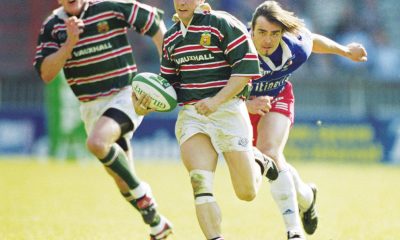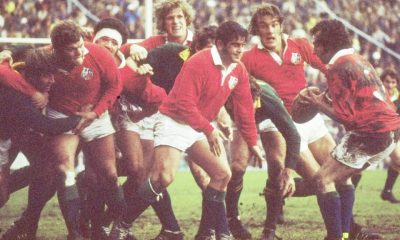 The last time Wales sent their Grand Slam champions to Australia, the Wallabies subjected them to all manner of mayhem. What happened during that damaging trip more than 30 years ago made it arguably the most contentious Test series Down Under since Harold Larwood terrorised the Australian batsmen between the wars – a Welsh version of the infamous ‘Bodyline’ tour.
The last time Wales sent their Grand Slam champions to Australia, the Wallabies subjected them to all manner of mayhem. What happened during that damaging trip more than 30 years ago made it arguably the most contentious Test series Down Under since Harold Larwood terrorised the Australian batsmen between the wars – a Welsh version of the infamous ‘Bodyline’ tour.
Before the series began, manager Clive Rowlands wanted to take Wales home in protest at his hosts flouting an agreement allowing the visitors a say on the appointment of the referee. At the eleventh hour, the WRU averted a major diplomatic incident by instructing ‘Top Cat’ to stay put and make the best of a bad job.
No sooner had a Queensland referee, Bob Burnett, been foisted on them for the opening Test in Queensland, than Wales captain Terry Cobner threatened to take his troops off the field before half-time after a heated exchange over what he and his team considered to be one-eyed refereeing.
Mr Burnett rather gave the game away at the very start, togging himself out in the maroon socks as worn by the Queensland State team. Wales lost and when they lost again at the Sydney Cricket Ground the following Saturday, they did so because of a late drop-goal from Australia’s star fly-half, Paul McLean which apparently missed the posts.
Dick Byers, another Australian referee because nobody in 1978 had thought it might be better to have neutral ones, cocked a deaf ear when several Welsh players tried to advise him that the kick had, in the words of one, missed by ‘three or four yards.’
By then, Wales had lost the fights as well, most notoriously the top-of-the-bill one-puncher when Wallaby prop Steve Finnane, a Sydney barrister, slugged an unsuspecting Graham Price. The blow shattered the Welshman’s jaw and provoked Rowlands to ignore protocol at the after-match banquet and speak out about ‘thuggery.’
Before they touched down back at Heathrow, the Welsh had so many casualties that JPR Williams had to be pressed into emergency service in the back row. Never slow to come forward in his country’s cause, JPR felt so upset by certain aspects of that tour that he ‘seriously considered whether it was worth still playing rugby‘.
The sight of Price with his jaw bandaged and full-back Alun Donovan disembarking in a wheelchair alongside the limp and the lame provided a grim post-script to the trip. Some, in their naivety, had made the mistake of taking the tour as a reward for winning the Slam, a ‘jolly’ not to be taken too seriously against a country then not in the same league as South Africa or New Zealand.
The vanguard of another Welsh Slam team arrived in Australia the other day for only their second series since the punishing one of 1978. Needless to say, they lost the last one, five years ago by an aggregate score of 60-23.
It is fair to suggest that the Aussies have never forgiven Wales for beating them Down Under at the first attempt, at the Sydney Cricket Ground in 1969. Gerald Davies, Dai Morris and John Taylor scored tries, Keith Jarrett converted both and added two penalties in a 19-16 win.
They have been paying for it ever since. In the course of winning every subsequent home Test against Wales, the Wallabies have inflicted even more pain, in a perfectly legitimate sense, than during the nasty incidents of 1978.
In what was laughably described as preparation for the 1991 World Cup a few months later, Wales lost 63-6 before embarking on a still more disgraceful performance off the field. The after-match dinner in Brisbane that night degenerated into a dance-floor brawl between rival factions within the Welsh squad.
The first three-Test series between the countries offers Wales a heaven-sent opportunity to start balancing the books, to remind the Aussies that a Welsh Grand Slam team is not to be mucked about, unlike the one in 1978.
Too often, Wales have flown south of the Equator without hope. The defeats have been on a nightmarish scale – an aggregate 106-12 in successive mis-matches against the All Blacks in New Zealand in 1988 followed ten years later by 96-13 against the Springboks in Pretoria.
Too often Wales, like the other home countries, have been beaten before they started, all too quick to use their knackered state at the end of a long domestic season as an excuse. They cannot play that card this time, not least because the Aussies have been more handicapped by injury.
Wales under Sam Warburton will expect to win at least one of the three Tests and, at worst, take the series to a decider at the Sydney Football Stadium on June 23. As champions of Europe, intact with the notable exception of the injured Jamie Roberts, they ought to be good enough to succeed where their Grand Slam predecessors failed in 1978.





























You must be logged in to post a comment Login